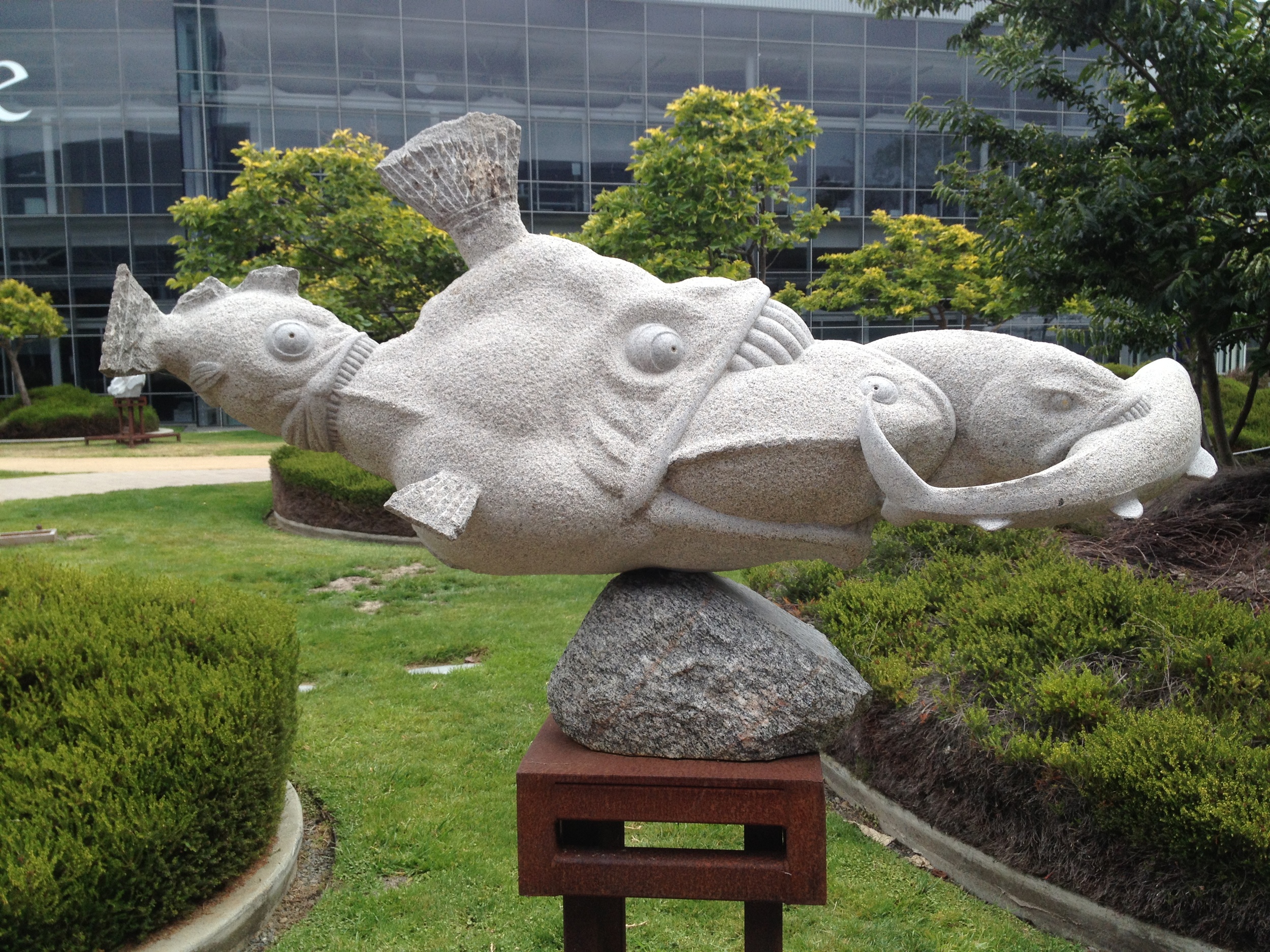I spent last weekend at the SciFoo unconference at the Googleplex in California, and had a whale of a time. SciFoo collects around 200 people from all over science who hop from one fascinating topic to another, with hour-long sessions running in parallel. So here's a spot of Blog-foo...
Cosmology was well-represented, and we did a session on the current state of play in the field. Saul Perlmutter and Brian Schmidt kicked off with a précis of the data, the evidence for dark energy, and the implications of Planck's survey of the microwave background. I followed with the "consensus" view of the very early universe: about a trillion, trillion, trillionth of a second after the big bang an era of ultra-fast growth known as inflation sets the stage for the cosmos to evolve into the form it has today. Next up, Paul Steinhardt suggested alternatives (primarily a cyclic universe of some form) and asked what sets the stage for inflation itself -- followed by an amiable free-for-all between the participants. Ironically, Paul contributed key features of the inflationary paradigm in the early 1980s, so I was in the odd position of backing inflation against a critique from one of its parents, while the non-cosmologists seemed to enjoy finding out what is at stake in our field. (And I have a couple of ideas to work on now I am home, thanks to some conversations.)
Space Exploration is always a big deal at a geekfest, and NASA's Ames facility is just down the road from Google's HQ (indeed, Google keeps its planes on their airfield). Space is supposed to be spectacular but in a political environment where any setback can be spun as a waste of public money, the slogan "failure is not an option" becomes a charter for a sclerotic and risk-averse organization. Worse, in many eyes NASA is a self-licking ice-cream cone captured by politically connected aerospace firms, despite twittergenic rovers and the long-serving Hubble. My opinion of NASA went up a number of notches thanks to Pete Worden, the director of NASA Ames. For one thing, Worden introduced the self-licking ice-cream into the lexicon (before he worked there) and he made the human exploration of the solar system seem exciting and achievable. Thanks to Space-X and other private launch companies, the technology used to get into space is evolving more rapidly than it has in decades while the moon, Mars and asteroids provide us with a plethora of things to do when we get there. I'm excited.
From NASA to the NSA - if NASA is an inefficient bureaucracy under the thumb of the aerospace industry, the post-Snowden National Security Agency presents the opposite problem: apparently controlled by nothing and no-one, it is too efficient for comfort. Several members of the "intelligence community" (a loose agglomeration of entities -- these were real people with surnames and webpages) attended SciFoo along with the usual crew of techno-libertarians, so the national security sessions were lively.
For me the most interesting part of the discussion was hearing from people who backed the intensive data-collection. A distinction was drawn between spying in the interests of national security and for purely commercial advantage (cough-China-cough) and the point was made that people don't typically join the CIA because they hate their Constitution. (On the other hand, if you're not American, you're fair game.) The "national security people" clearly saw value in the massive data-collection that is now more or less openly acknowledged, and I am prepared to believe that "lives have been saved" (and very likely other lives have been taken, but different lives) as a result of this effort. Perhaps not as blunt as the misattributed Orwell, "We sleep safely in our beds because rough men stand ready in the night to visit violence on those who would harm us", but there was a whiff of that -- along with the usual intelligence bind of not wanting to tip off the bad guys.
Personally, a computer in a Utah data-center parsing my email bothers me less than toddlers being patted down by a human being before they fly, and the civil liberties issue is more abstract for me than "stop and frisk" is for inner-city African Americans. However, there is little doubt that the apparatus of a full-on surveillance-state has been built, and the uses to which it is put are determined largely by policy and people, rather than technical capability. Which is indeed something to ponder.
From Open Secrets to Open Data Unlike the NSA, scientists like people knowing what we are up to, and open science is on the agenda for any gathering of scientists -- especially a meeting held at Google. And again I was struck by the gap between the biosciences and my area of particle-astro physics, where data-sharing and open access are already the norm.
Science Communication and Sexing it Up for Nature The journal Nature co-sponsors SciFoo, but it came in for regular pastings from some participants. Nature has a reputation (and not without reason) for pressuring academics to hype their results in order to maximize the impact of the work it publishes. Coupled to the widespread practice of counting papers in Nature (and a handful of similar journals) as a proxy for more measured assessments of achievement, scientists looking to climb the ladder to a stable career can feel obliged to play along.
Helen Czerski convened a session to asked what could be done about this state of affairs. One answer was nothing, because it's not happening. This came from a few of the silverbacks, whereas the cubs took it for granted that it did. We also heard about PR companies that burnish the images of individual scientists (for a fee) -- and I have been on the receiving end of their pitches, and they are indeed creepy.
In retrospect, one thing that wasn't on the table was the role of the blogosphere and the 24-hour news cycle in this situation. The "new" sci-comm is fantastic, informal, inclusive and fun. But bloggers and tweeters are key consumers of the media releases cranked out by Nature and university media people, and come largely from the same demographic as the scientists who complain about pressure to sex it up for Nature. If Nature didn't exist, would we have needed to invent it?
Raising Geeks An unexpectedly moving session on raising geeks was convened by Eric Siegel -- the discussion elicited a string of "it gets better" stories from participants who grew up geek, and I suspect most of the parents in the room had a moment where they wondered why they were in Mountain View, instead of building lego with our kids, teaching them to code, hiking, fixing a bike, inventing recipes, going on a ramble in the woods, or dragging out the telescope. (But kids who like science love swag from science conferences, so at least I scored there.)
And what else? The Sahara desert is cool, you're going to be hearing a lot about synthetic biology in the next little while, and amazing visualizations -- data presentation has come a long way from being sure to label your axes. And I (briefly) got to try a pair of Google glasses. If nothing else they will let people make eye contact while simultaneously reading twitter. It's a brave new world.
The Googleplex Can't not mention the location -- it is a magical place. The campus is gorgeous, smart people wander around with MacBook Airs, there are hop-on hop-off the multicolored bikes all over the place, and quirky art and toys abound. Also a (parked) driverless car and a T-rex skeleton. And yes, free food. Each according to their needs, and each according to their means, at the heart of modern capitalism.
Google's corporate motto, "Don't be evil" may look a bit thin at times, but it is on full display at home. In the Garden of Eden, we are told that food and drink was free for the taking -- which pretty neatly describes a place where the cafeterias have no cash-registers and an ice-cream cart gets pushed through the room on a regular basis (Cherry Garcia, don't mind if I do). But at Google, a crew of polite, blue-shirted security people gently steer you away from the places where the magic is actually made: a serpent wouldn't get past the gate.
Looking back SciFoo is -- in part -- a celebration of science, but problems within science and problems science has made for the world were key themes of SciFoo, turning it into something more than a mutual admiration session. But scientists like to fix problems, and for me that was the most rewarding aspect of the conference -- after SciFoo, it is easy to believe that the world can be a better place. Thanks.



